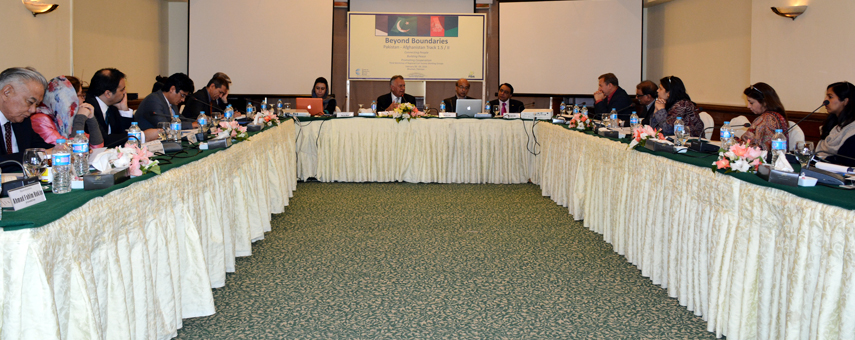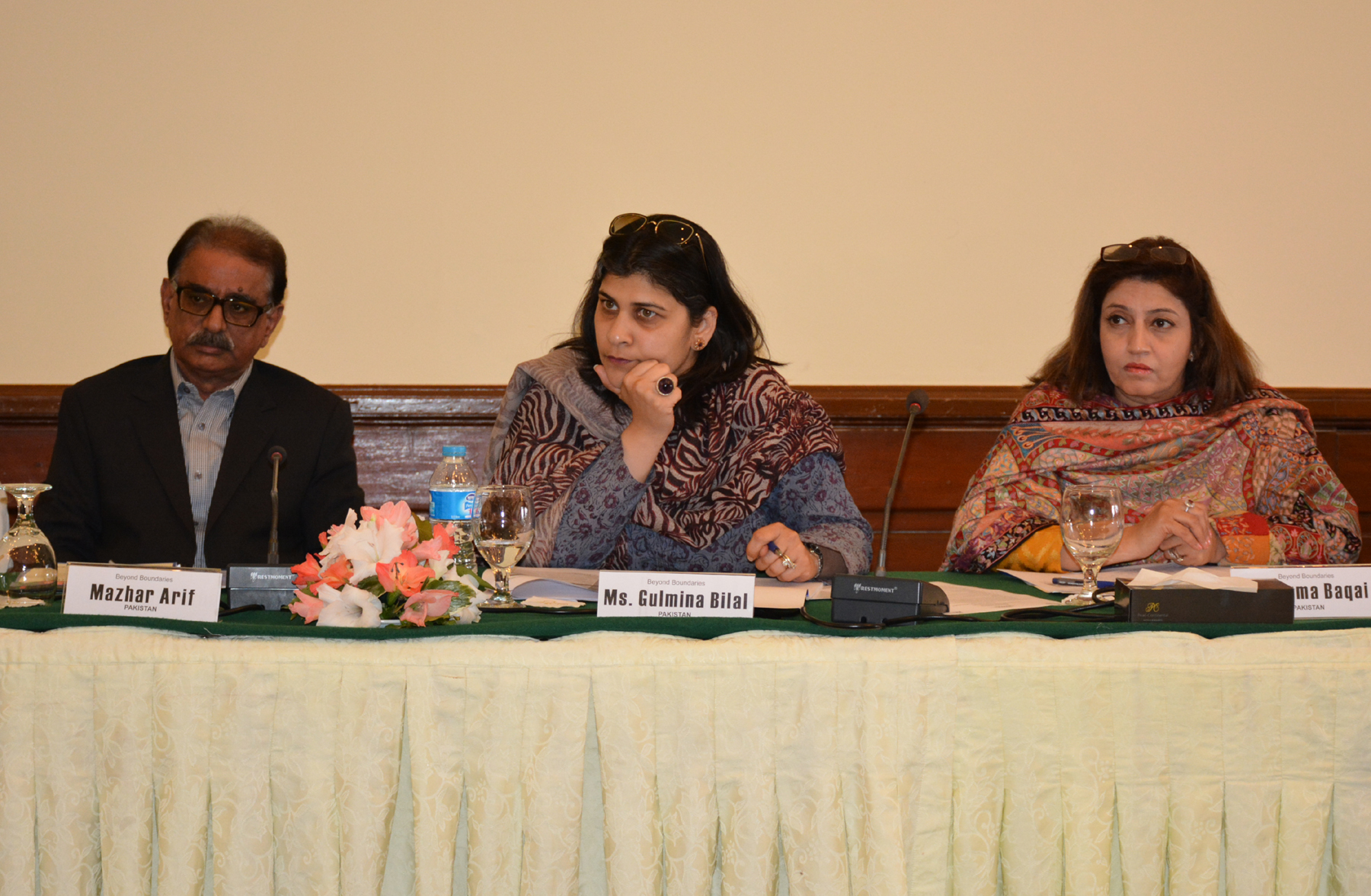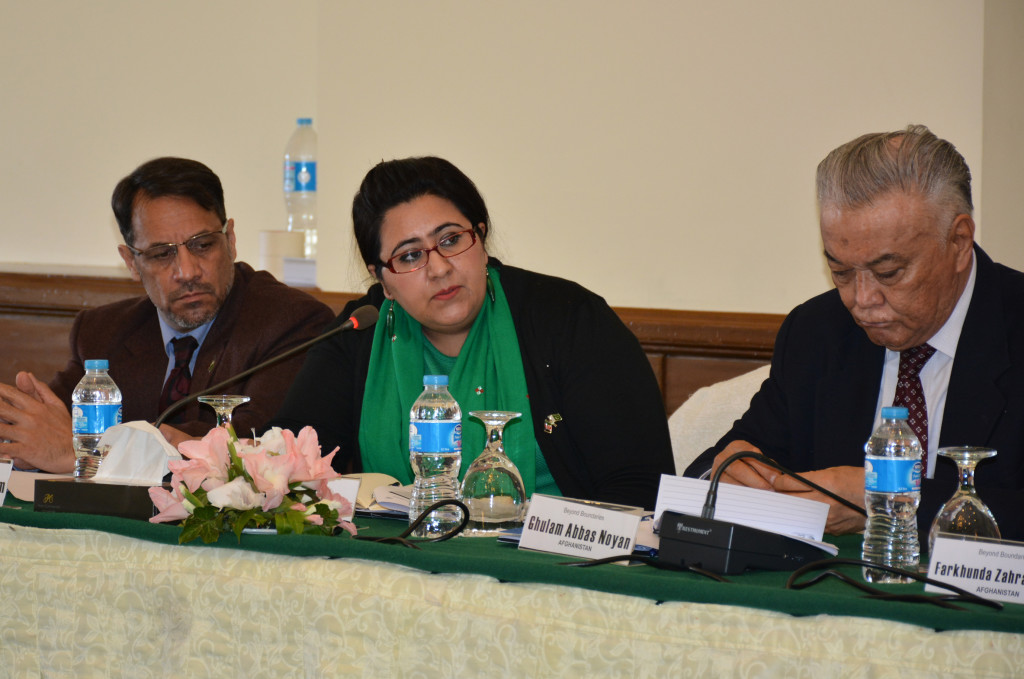As part of CRSS led “Beyond Boundaries” project in partnership with Afghan counterpart organization DURAN and sub- national partners FIDA, Pakistan- Afghanistan track 1.5/ II initiative as an effort to improve relations between Afghanistan and Pakistan, a ten member high profile civil society Afghan delegation arrived in Islamabad on 07 February, 2016. The “Beyond Boundaries” is a series of dialogues/ workshops between civil society and security leaders and stakeholders of both countries and comprises two working groups; Regional Civil Society Group, and Regional Security Group. These two working groups have so far held four meetings, two in Islamabad, and two in Kabul between December 2015 to January 2016, the fifth workshop in this series, between the Regional Civil Society groups, was held from February 8-9, 2016 at Bhurban.
The Afghan delegation was led by Ms. Samira Hamidi, Senior Women’s Rights Advocate and Human Rights Trainer, other members included Mr. Ghulam Abbas Noyan, Founding Member, Rights and Justice Party, Former Member of Parliament and Political Analyst ; Mr. Idress Zaman, Managing Director, Cooperation for Peace and Unity (CPAU); Ms. Farkhunda Zahra Naderi, Former MP and women’s rights advocate; Mr. Ahmad Fahim Hakim, Human Rights Defender and Civil Society Activist; Mr. Maiwand Rahyab ,Executive Director of Afghanistan Institute for Civil Society (AICS); Mr. Mohammad Omar Sharifi Political Analyst, PhD Candidate Boston University ; Mr. Barry Salaam, Afghan Civil Society; Mr. Mirwais Wardak, Managing Director with Peace Training and Research Organization (PTRO); and Mr. Omaid Sharifi, Activist, Campaigner, Co-Founder ArtLords & Hamdeli Networks.
The Pakistani delegation was headed by Ms. Huma Baqai, Associate Professor, Chairperson, Department of Social Sciences, IBA (Karachi), while other members included Ms. Gulmina Bilal , Executive Director, Individualland; Mr. Hasan Khan Journalist, Political and Security Analyst and Commentator ; Mr. Naseer Memon, Chief Executive, Strengthening Participatory Organization (SPO); Mr. Rehman Azhar, Anchor, news producer and correspondent at Aaj News Television; Mr. Mazhar Arif, Executive Director, Society for Alternative Media and Research; Ms. Tehmina Zafar, Consultant, Bytes for All ; and Mr. Malik Ahmad Khan, Member (Infrastructure and Regional Connectivity), Planning Commission of Pakistan.
During the two day workshop six sessions were held with inter-active discussions and deliberations between both working groups. The day one first session was on Post Quadrilateral Meetings Scenario, where they discussed Peace Talks and Reduction in Violence, What disruptive factors can deteriorate Pak-Afghan relations: Causes, Potential Solutions and Way forward. The two day workshop was chaired by Former Ambassador Qazi Humayun (who had served as Pakistan’s ambassador to Afghanistan and at Afghanistan division besides other important positions). The Afghan and Pakistani working groups welcomed the Quadrilateral dialogue and the decision taken by respective states to hold another session on Feb 23rd 2016 in the hope that the process continued with added transparency and in line with globally accepted fundamental values, that the Taliban would attend the session as interlocutors, and that women’s perspective would be taken into consideration in the forthcoming Quadrilateral discussions. The members noted that the mutual negative perceptions could disrupt the Quadrilateral dialogue and bilateral relations and thus needed urgent attentions from those at helm of Pakistan and Afghanistan. These potentially disruptive factors mainly include Afghan perception of Pakistan support to Afghan Taliban. Conversely, Pakistan’s perception of Afghanistan’s lack of action against elements involved in subversive activities in Pakistan, interplay of ideology and money in sponsoring terrorism, the evolution of radical organizations in the region, possible escalation of violence, the anticipated spring offensive, the politicization of the refugees issue and sensationalized reporting. Given the significance of free media, and with the aim of orienting bilateral relations in a positive direction, the delegates emphasized upon institutions and think tanks to jointly conceive media projects and organize exchange of journalists while underscoring the need to set up a Joint Pak-Afghan Civil Society Working Group for long term cooperation.
During the second and third sessions, the groups discussed: Steps to promote Pak-Afghan Bilateral Ties, Role of Pakistan, Role of Afghanistan, Media and Civil Society Engagement. Education Cooperation, Private Sector cooperation- i) concessional tuition fees for enhancing cooperation in the field of education, ii) Opening up of model schools in Afghanistan by leading Pakistani school chains and State to State cooperation including scholarships, fellowships and faculty exchange programs, Private Sector Scholarships. Underscoring the need for both countries to review their educational curriculum in order promote tolerance, peace and civic education, the Beyond Boundaries delegates believed that the educational collaboration between both countries was crucially important and urged their respective governments to develop a comprehensive and transparent program for scholarly exchange between two countries. These may include scholarships (up to PhD level), visiting scholar programs and alumni networking on both sides, through engagement of credible and reputable educational institutions.
The fourth session day one included inter-active discussion on Economic cooperation, key connectivity related infrastructure projects, reviewing the mutual targets set during the recent joint economic commission meeting (November 2015). Emphasizing on the need for improved economic relations, the civil society members suggested facilitating the business visa regime, increase trade through facilitation of transit routes, and expeditious completion of all infrastructural projects to which Pakistan was committed. They also said that there was a dire need to help shape the prevailing negative narrative into a positive and mature relationship through people to people contacts and effective role of civil society towards confidence building measures. They also highlighted the need for twinning of sister cities between the two countries. Increasing bilateral trade and expeditious completion of Pakistani infrastructural projects in Afghanistan can be conducive to improving Pak- Afghan economic relations.
The day two fifth and sixth sessions discussed: Policy recommendations, Way forward from Kabul Joint declaration (Nov 2015), Discussion on implementation and achievements as well as 3rd Meeting’s policy recommendations; Both heads of delegations to devise joint policy recommendations after consultation with their respective delegation members, and Present the draft recommendations to both groups for unanimous approval.
The working group members unanimously endorsed taking indiscriminate action on both sides against unconstitutional non-state actors. They emphasized on the need to promote cultural ties by building on existing historical linkages organizing seminars, cultural and literary events, concerts, exchange of visits of writers, students, opinion makers, developing films and documentaries. Also expand the scope of these activities beyond Islamabad and Kabul, with the broader aim of creating a conducive ambiance for people to people relationship and strengthening impulses for peace, stability and cooperation.
The Pakistan- Afghanistan Regional Civil Society working groups unanimously approved and passed a joint declaration, which is produced below in the Joint Declaration header.
The visiting Afghan delegation as part of the programme / agenda during this visit also held important sideline meetings with Foreign Secretary, Mr. Aizaz Ahmad Chaudhry, the visiting US inter-religious scholars, and federal mister for planning, development and reforms, Mr. Ahsan Iqbal. The report on these meetings are also produced below under the Sideline Meetings header.









